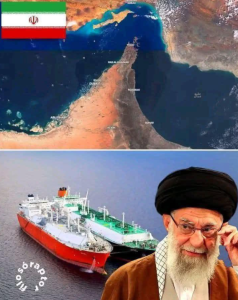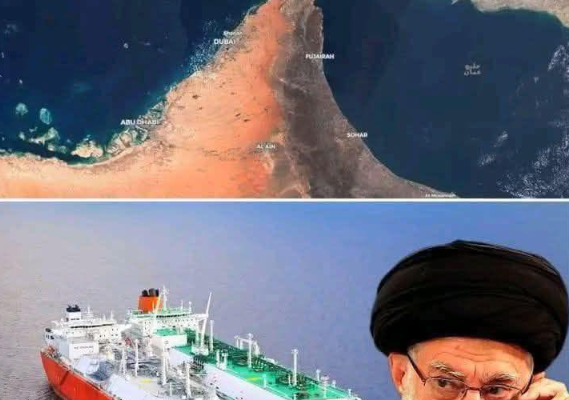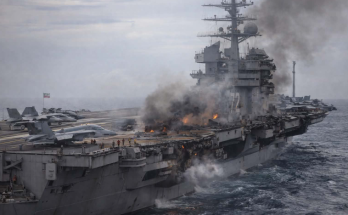
“BREAKING: Iranian Parliament Approves the Closure!” — A World Holds Its Breath
It began with a headline. Sharp. Unfinished. Alarming.
BREAKING, IRANIAN PARLIAMENT APPROVES THE CLOSURE!
No context. No location. Just a rupture. A signal that something vital had shifted. And in that ambiguity, the world paused.
The closure in question? The Strait of Hormuz—a narrow waterway at the mouth of the Persian Gulf, through which nearly 20% of the world’s oil supply flows. A lifeline. A chokepoint. A corridor of commerce and conflict.
And now, a potential flashpoint.
The Vote That Shook the Gulf
On Sunday, Iran’s parliament voted to approve a proposal to shut down the Strait of Hormuz. The move came in response to U.S. airstrikes targeting Iranian nuclear sites—an escalation that reignited fears of regional war.
The vote wasn’t symbolic. It was strategic. It signaled intent. It handed the final decision to Iran’s Supreme National Security Council, which now holds the power to turn rhetoric into reality.
Esmaeil Kowsari, a senior lawmaker and Revolutionary Guards commander, stated bluntly:
“The parliament has come to the conclusion that it should close the Hormuz Strait.”
But the world heard something deeper:
“We are willing to risk everything.”
The Strait: A Thread of Global Dependency
At its narrowest, the Strait of Hormuz is just 33 kilometers wide. The shipping lanes? A mere 3 kilometers across. Yet through this sliver of sea flows the lifeblood of global energy:
- Over 20 million barrels of oil per day
- Massive volumes of liquefied natural gas, especially from Qatar
- Exports from Saudi Arabia, Iraq, the UAE, Kuwait—and Iran itself
To close the strait is to choke the world.
The Psychology of a Choke Point
Why does this moment feel so fragile?
Because the Strait of Hormuz is more than geography. It’s metaphor. It’s tension incarnate. A place where diplomacy and defiance collide. Where ships carry not just oil, but the weight of global interdependence.
To approve its closure is to flirt with chaos. To weaponize geography. To turn trade into threat.
And in that decision, we glimpse the psychology of brinkmanship.
The Echo of “Closure”
The word itself—closure—carries layers.
- In diplomacy: a blockade
- In psychology: an ending
- In grief: a reckoning
Iran’s vote reverberates beyond policy. It taps into a global unease. A sense that the world is closing in. That certainties are collapsing. That the corridors we once trusted are now battlegrounds.
The Specter of Oil Shock
Analysts warn that if the strait is closed—even temporarily—oil prices could surge by 80% in the first week alone. Supply chains would buckle. Inflation would spike. Fragile economies would fracture.
And yet, Iran itself would suffer. China, its largest oil customer, has already signaled concern. Disrupting the strait could alienate allies, provoke retaliation, and destabilize Iran’s own export infrastructure.
So why approve it?
Because sometimes, in the theater of geopolitics, the threat is the message.
The Ritual of Watching
Around the world, screens flicker with updates.
- In Berlin, traders stare at oil futures.
- In Siem Reap, a café plays the news on loop.
- In New York, a mural appears overnight: a map of the strait, painted in red.
People don’t just read the news. They ritualize it. They gather. They speculate. They mourn the stability that once felt permanent.
The Unseen Cost
Beyond oil and diplomacy, there’s another cost: the emotional toll.
For families in the region, the closure means fear. For sailors, uncertainty. For citizens, the dread of escalation.
And for the world, a reminder that peace is not passive. It must be protected. Negotiated. Chosen.
The Silence from Tehran
Since the vote, Iran’s leadership has remained measured. No immediate action. No closure yet. Just the possibility.
That silence is strategic. It keeps the world guessing. It holds the tension taut.
And in that silence, we hear the hum of engines. The creak of diplomacy. The whisper of war.
The Archive of Ambiguity
This moment will be remembered—not just for what happened, but for what almost did.
It will live in headlines, in murals, in whispered conversations. It will be studied in classrooms. It will be painted in oil. It will be mourned in silence.
Because the closure wasn’t just physical. It was emotional. It closed a chapter of certainty.
And So We Ask Again
BREAKING, IRANIAN PARLIAMENT APPROVES THE CLOSURE!
What does it mean?
Maybe that the world is more fragile than we thought. Maybe that diplomacy is a dance on a narrow bridge. Maybe that closure is not an end—but a beginning.

